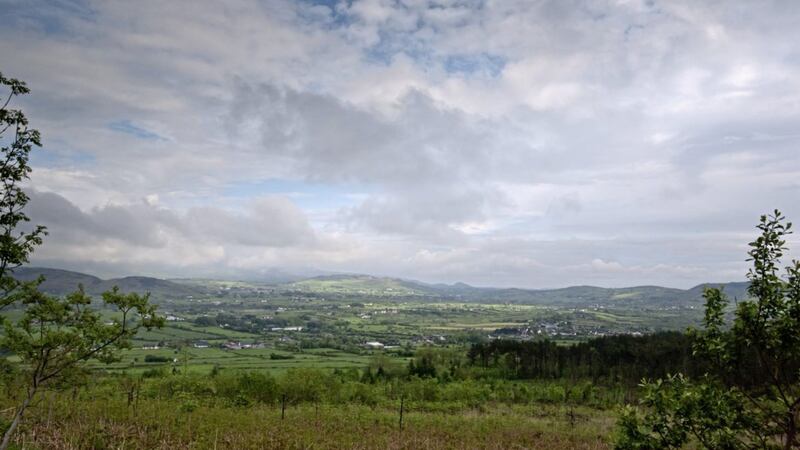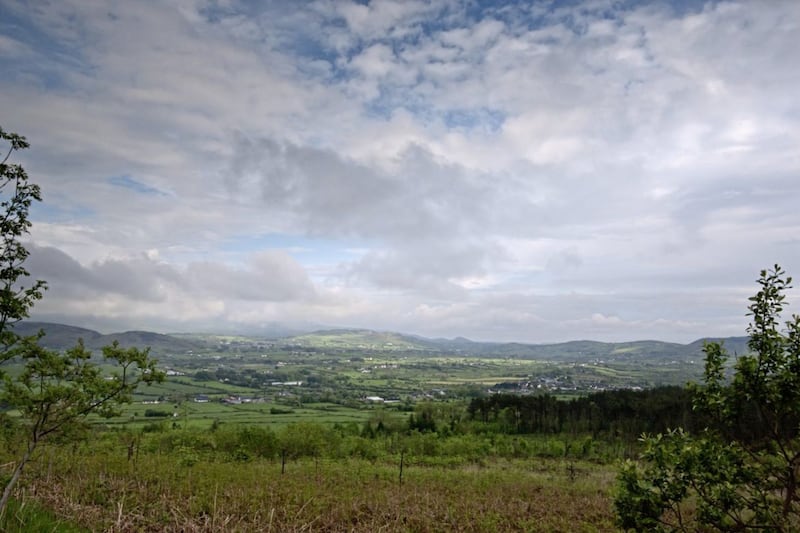I remember well my grandmother's wake. I was sent to bed early but could still hear voices coming from the kitchen as bottles of McArdle's were passed around the table.
I slept in the box room with its large foreboding picture of St Patrick standing on a rock, as snakes slithered beneath his feet and fled into the sea.
Unsettling as the snakes were, I wanted to earwig on downstairs.
Creeping from my room to the top of the landing, I cocked my ear through the bannisters.
Seeping out through the smoke vent above the living room door, the murmurs from the women saying the Rosary sounded like a swarm of bees.
Listening intently, I could hear the men talk about a fairy tree which was cut down by a thick-headed local builder and how the same fella hadn't a day's luck since.
And then, speaking in a softer than usual tone, my great uncle mentioned the banshees and how they stalked the countryside foretelling of death with their wailing and shrieking.
My deceased granny was an O'Gorman. And they said banshees followed those Irish families with a prefix of 'O' or 'Mc'. My great uncle declared he heard one himself.
I started recounting the surnames of neighbours on either side of my granny's house and was mighty relieved there wasn't a 'Mc' or an 'O' between them. With a little encouragement, a small boy's imagination does not take much to stir it.
My great uncle was in full flow as he talked about a Ballybot resident who died. This poor man had a crooked back and because of his deformity, those laying him out had to weigh down his legs in the coffin.
As Irish tradition has it, all the mirrors were covered, the clock was stopped and the curtains were drawn. A single window was left open so the soul of the deceased could depart.
During the prayers for the dead, two local lads reached through the open window and from behind the closed curtain cut the tether to the deceased legs.
The departed immediately sprung up in the coffin to the shock and horror of the assembled. The room scattered with women bawling and Rosary beads clicking so much they sparked.
I laughed so loud my cover was blown and was ordered back to bed. Years later I would discover one of those two lads was my own grandfather...
Hughie was a storyteller - though he wouldn't have called himself that.
Then the oral tradition was still alive and well in the border region and in every yarn told there was a grain of truth which got diluted with time and embellishment. But the stories were memorable. It's why I can recount them so clearly nearly 50 years on.
South Armagh has a rich heritage of folklore and storytelling. It's a heritage I share as generations of Kellys once lived under the shadow of Slieve Gullion.
They would have told and retold how Fionn of the Fianna was tricked by the local witch, Calliagh Berra, into losing his youthful looks. There is still something mystical about the burial cairn atop of Slieve Gullion, where it is said the Calliagh Berra still roams.
In the 1980s, as the Troubles raged on, many of us made our way out to Forkhill - then heavily fortified - to listen to two amazing seanchaithe, or storytellers: the late John Campbell and 'Micil' Quinn, who recounted ghost stories and humorous tales, all made up but dramatically told to an enthralled audience.
As south Armagh historian Una Walsh says of the area: "Lift a stone here and you will find a story."
Both John and Micil were renowned and their stories were not always about the past - many were very much of the present. Like the irate driver stopped by an Army patrol.
"Where you coming from?" asks the soldier, to which the driver drawled: "From Killyman." And where are you going to? "To Kilmore," says the driver.
These men carried on an oral tradition which once dominated south Armagh and other rural communities in Ireland.
Campbell and Quinn were very popular but they didn't have to compete with social media and digital platforms. These days the very art of simply talking is under threat.
But amongst the rolling hills of south Armagh, from Crossmaglen to Mullaghbawn and from Silverbridge to Camlough, the area is being transformed by a breathtaking revival of culture.
The flame of the oral tradition is being rekindled in song, language and poetry.
More importantly, it is being revived by concerned individuals and dedicated communities who recognise the richness of storytelling in word and song.
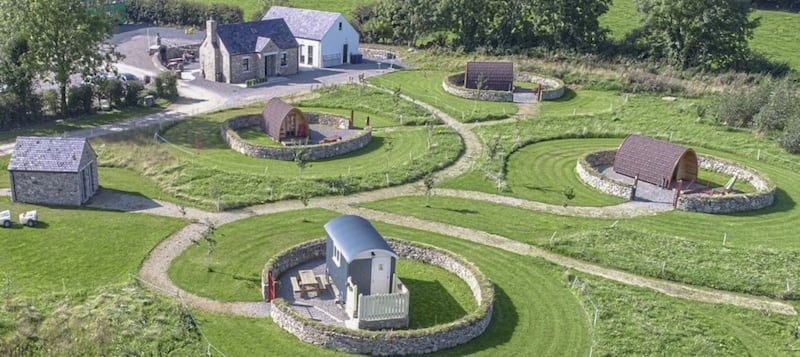
To partake in this revival, I recently decided to celebrate the birthday of 'the Boss' with a stay over at the award-winning glamping site, Bluebell Lane, in Mullaghbawn.
Local artists Colleen Savage and Padraig Carragher were staging a 'Sing for your Supper' evening at the big Round House within the complex. I was assured that even if you could not sing, you could tell a story or yarn and still get your supper - a hearty bowl of vegetarian stew washed down with Mac's Armagh craft cider.
About 20 brave souls showed up. The night didn't disappoint as each of the guests encouraged - or gently cajoled... - by Colleen and Padraig sang, joked, played music or simply exchanged yarns.
The evening sped by to the sound of laughter and the lilt of music. It felt so strange to be out and enjoying company without sight of the ubiquitous iPhone or iPad.
It was how I imagined ceildh houses used to be, a place filled with craic, cairde agus ceol.
Colleen and Padraig, apart from being celebrated artists, have an amazing ability to make people feel at home. Visitors were not being entertained so much as entertaining themselves.
As the Walter Scott poem Cadyow Castle goes: "The song went round, the goblet flow'd, / And revel sped the laughing hours." And so as the goblets ran dry our evening ended.
'The Boss' was even more relieved to discover we would be gazing at the stars from the warmth of Bluebell Lane's lovingly restored cottage and not from the equally beautiful but more 'rustic' Shepherd's Hut.
Slieve Gullion is a wonderful sight first thing in the morning. The rising sun fades the morning mist leaving the grass and trees glistening as if adorned by Swarovski diamonds. But we were off just down the road to Silverbridge.
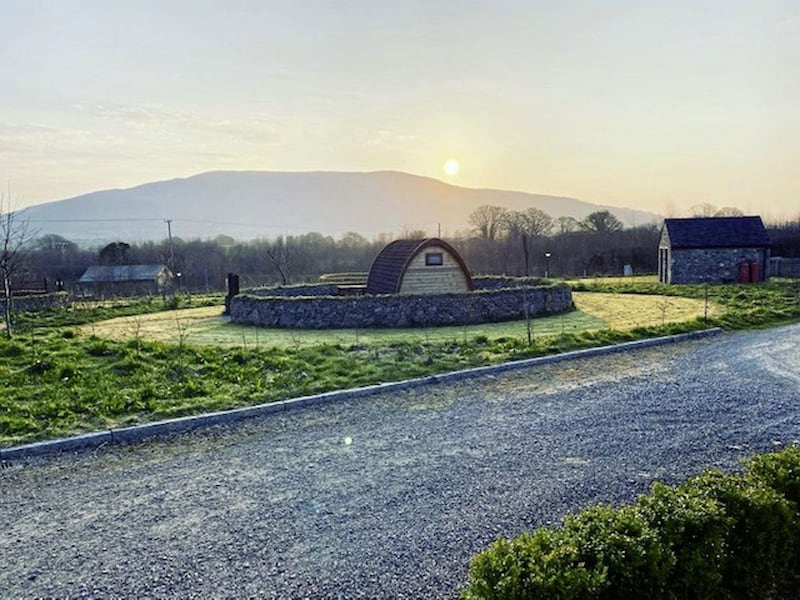
An Tobar has been through several incarnations as a working farm, garden centre, social farm, cafe and wellness centre. As the name suggests, it's all about people and bringing them together. It's is a warm and welcoming place.
Now a third generation of the Agnew family is adding her contribution to the story of An Tobar.
Hannah Agnew, a young artist, was reared in the foothills of south Armagh and she went to study and live in England. It is a well trodden path.
But after some time, Hannah decided to return because she wanted to create a safe space and meeting point for the young (and not so young) LGBT+ community and their friends. And thus Cafe Amach was born - a first for south Armagh and perhaps in rural Northern Ireland.
Amach is a riot of colour. A rainbow haven complete with tray bakes, herbal teas and sustainably sourced coffee. The cafe provides, not just a focal point for the local LGBT+ community and friends, it's a vital resource and support hub for people living in rural communities.
Amach offers social gatherings and wellbeing courses. Most important of all, it's a shared safe space to simply sit chat, listen and, if you feel like it, sing. There's a sense of continuity with my night before and my visit to this place.
South Armagh is a rich tapestry of culture and now mindfulness too.
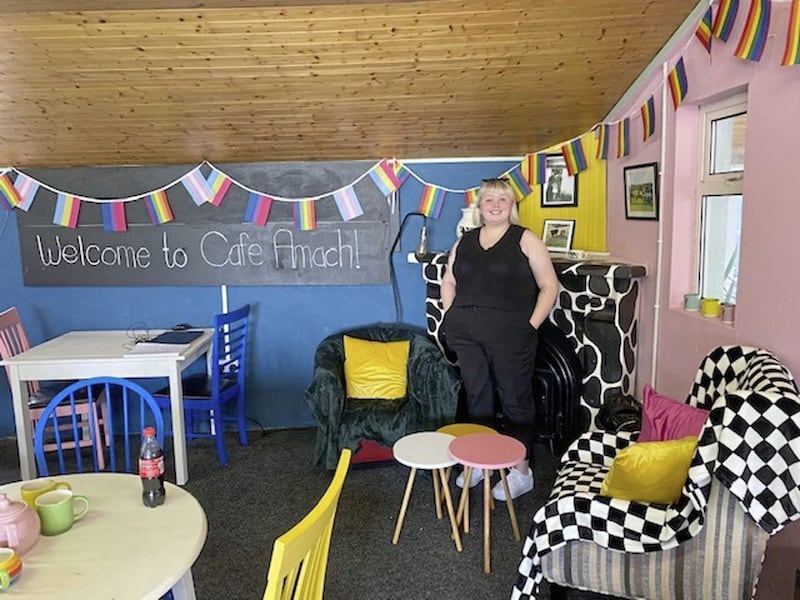
The South Armagh Poetry Group used the opportunity of Covid to share their thoughts through poetry. They recognised the impact lockdown was having on the mental health of many in rural communities.
'Room to Rhyme' is the result of their contributions collected and curated with contributions from south Armagh luminaries including veteran journalist Eamonn Mallie, Arts Council chairman Liam Hannaway and the encyclopaedic Una Walsh, a descendant of the famed 18th century poet and rapparee, Séamus Mór. This initiative saw funds going towards the Rural Health Partnership.
A short skip down the road to St Brigid's Shrine at Faughart, and here a visitor will find a place of peace and tranquillity. Ireland's second national saint was said to have been born here nearly 1,500 years ago and since then local pilgrims have flocked to her little stream and Holy Well.
Whilst relatively unknown compared to Croagh Patrick or Lough Derg, this place has its own charms.
Views stretch across the Cooleys, Carlingford Lough and down the plains of Ireland. The site predates St Brigid by thousands of years and the ancient stones alongside, where Stations of the Cross now stand, are said to contain healing powers.
This writer is a martyr to back pain so I rushed to the stone with the cure for backache and gave it a quick rub. These traditions are fading and it's unfortunate because they are very much part of our DNA.
With only birdsong to interrupt my thoughts, I perched myself on the wall of the Shrine and said aloud the words of a poem by Lurgan-born Mel McMahon: "I was there on my own in silence, and lost in words, words spoken - words thought." Poems are like prayers.
I thought how blessed are we that the glory all of this is on our doorstep and yet we don't visit.
Keeping traditions, customs and practices from one generation to another preserves unique characteristics of the environment which gave our forefathers sustenance and shaped them.
The dedicated ambassadors for the Ring of Gullion like Padraig, Colleen, Hannah, Mel and Una need support for their efforts.
Our stories are locked into this landscape. Now if only the trees could talk - what tales would they tell?
